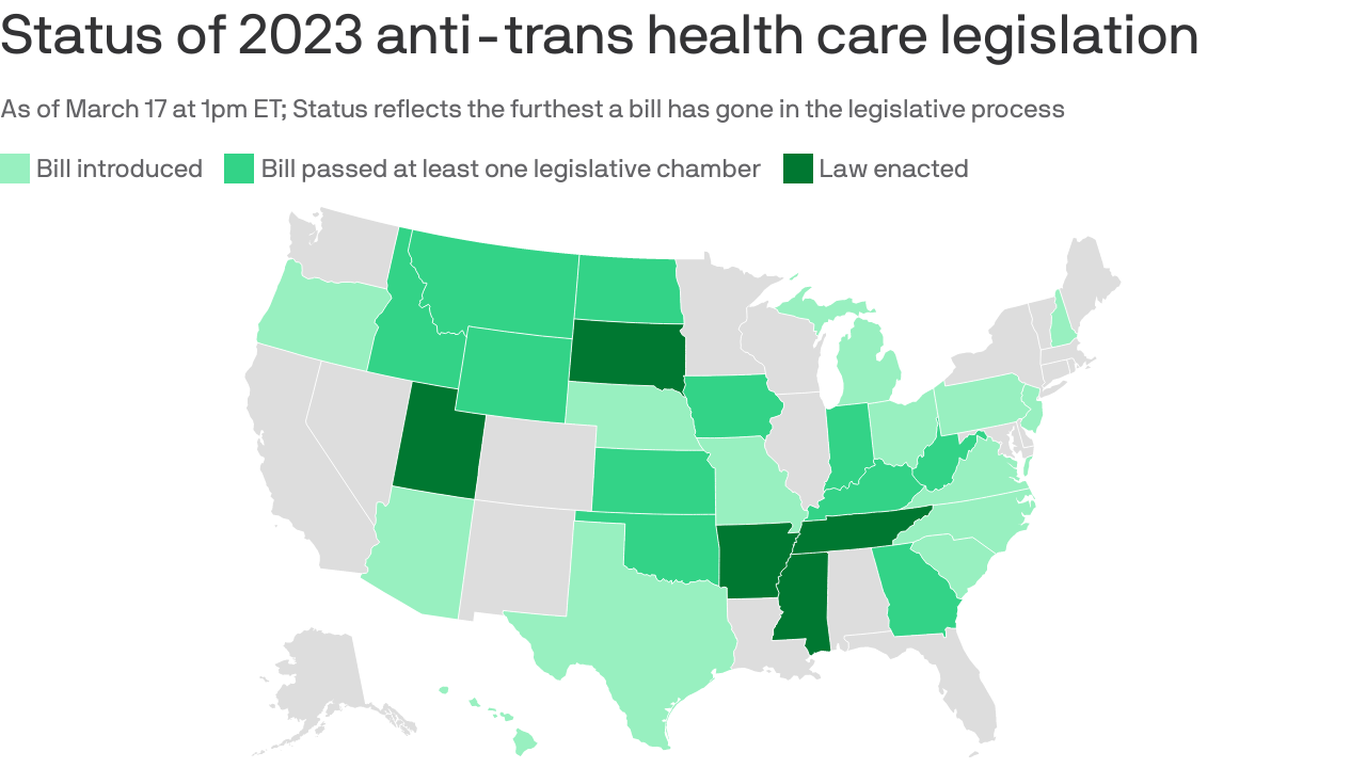What states are restricting transgender health care
Data: ACLU; Map: Alice Feng/Axios
Politicians in red states are placing new limits on gender-affirming care for transgender people, creating a patchwork of sanctions on health providers who offer such services and limits on access.
By the numbers: Over 100 pieces of legislation introduced in state legislatures in 2023 focus on banning aspects of gender-affirming medical care, according to data from the American Civil Liberties Union.
- Proponents of the measures have characterized gender-affirming care as “harmful” and “experimental” medical procedures. But such care has been deemed medically necessary and potentially life-saving for transgender youths by leading medical associations, including the American Medical Association and the American Academy of Pediatrics.
State of play: Utah in January enacted a law banning gender-affirming health care for transgender youth. Since then, Mississippi, South Dakota and Tennessee have followed suit.
- Arkansas in 2021 became the first state to make gender-affirming care for patients under 18 illegal, but the ban is being challenged in court. A similar law in Alabama is also on hold.
- Arizona in 2022 enacted a law prohibiting gender-affirming care from being offered to trans people under 18. That law is set to take effect in March.
- Florida last year became the first state to enact a ban through a non-legislative body, using a medical board appointed by Gov. Ron DeSantis. Legal experts fear it could set a precedent for restrictions on other forms of health care.
- Florida Republicans turned to executive action from DeSantis — who has openly opposed gender-affirming care for minors — after a legislative attempt failed, per legal experts.
- In Texas, Gov. Greg Abbott issued a directive ordering state agencies to investigate parents for child abuse for seeking gender-affirming care for their trans kids.
Reality check: 71% of LGBTQ youth — including 86% of trans and nonbinary youth — say that debate around state restrictions on LGBTQ young people has negatively impacted their mental health, according to a poll by The Trevor Project, which provides crisis intervention and suicide prevention services to LGBTQ youth.
Between the lines: Most anti-trans bills look to prohibit gender-affirming care for people under 18, but some states have introduced measures that extend to adults.
- Kansas, South Carolina, Oklahoma and Texas have bills moving through their legislatures to ban care for people under 21. Texas also has a proposed ban for people under 26.
Zoom in: Texas and Wyoming have bans that also categorize gender-affirming care as child abuse under state law.
What else is happening: Lawmakers in states like Indiana, Kentucky, Missouri and Oklahoma have introduced bills prohibiting the use of state funds to pay for gender-affirming medical care, as well as barring insurers from offering coverage.
What they’re saying: Opponents say the measures impose restrictions on the doctor-patient relationship.
- “Decisions around transgender medical care should be between trans patients, their families, and their doctors — not made by politicians,” said Kasey Suffredini, vice president of advocacy and government affairs at The Trevor Project.
Meanwhile… Lawmakers in at least 21 states are working on “trans refugee laws” that would allow out-of-state patients to seek gender-affirming care within their borders to avoid criminal prosecution, said Elliot Imse, executive director of LGBTQ Victory Institute, an advocacy group working with state lawmakers across the U.S.
Below are prominent anti-trans health care curbs in the 2023 legislative cycle.
Anti-trans health care bills that have been enacted
Arkansas: SB 199 makes it easier to sue health providers who provide gender-affirming care to a minor, effectively bringing back the state’s blocked ban.
Mississippi: HB 1125 states that health providers cannot offer gender-affirming surgeries, puberty blockers or hormone therapy to trans youth under 18. If a provider violates the law, they could lose their license and face civil lawsuits.
South Dakota: Under HB 1080, a health care provider cannot offer gender-affirming care “for the purpose of attempting to alter the appearance of, or to validate a minor’s perception of, the minor’s sex.”
- A medical provider risks lose their license, as well as risk civil action, if they provide this type of car to trans youth.
Tennessee: SB 1 says that a health provider cannot “perform or offer to perform” any sort of gender-affirming care to trans minors. Doing so puts a provider at risk of lawsuits from the minor, their guardian or the state attorney general.
Utah: SB 16 specifically prohibits health care providers in the state from performing gender-affirming surgeries on trans youth and places an indefinite moratorium on their access to hormone therapy and puberty blockers.
Go deeper: Axios Explains: Gender-affirming care in the U.S.
No Byline Policy
Editorial Guidelines
Corrections Policy
Source
